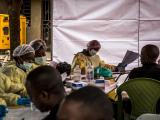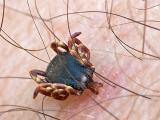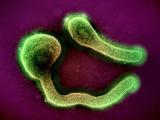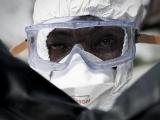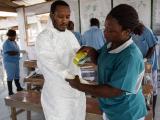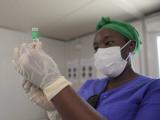Top United Nations (UN) officials visited Liberia's Grand Cape Mount County yesterday, an area neighboring the Sierra Leone border that experienced a recent spike in Ebola activity, to meet with local leaders and explore what more can be done curb the disease at national borders.
In the outbreak region, the Ebola total today grew to 20,972 cases, while the number of deaths rose to 8,259, according to the latest update from the World Health Organization (WHO). The total reflects an illness increase of 225 and 24 more fatalities than the WHO reported yesterday.
Cases have now surpassed 10,000 in Sierra Leone, the hardest hit of the three main outbreak countries. However, Liberia still has the most deaths.
High-level visit to Liberian hot spot
The UN group included Ismail Ould Cheikh Ahmed, who recently took over as head of the UN Mission for Ebola Emergency Response (UNMEER) and is touring all three of the hardest hit countries. According to today's UNMEER update, the UN group invited traditional and religious leaders in the Liberian county, along with area health officials, to a series of meetings.
Cases have declined dramatically in Liberia, but health officials are watching some hot spots and have warned that a let-up in the response could reverse the country's progress in fighting the virus.
Ould Cheikh Ahmed said national ownership is a key to winning the Ebola battle and international partners need to respect local customs when launching response activities, especially safe, dignified burials. During the meetings, the UN learned that key challenges in the county include gaps in monitoring cross-border traffic, ongoing traditional practices, secret burials, pockets of community resistance, and motivation lapses among response teams.
The group visited a new Ebola treatment in the Grand Cape Mount city of Sinje before traveling on to Sierra Leone, UNMEER said.
MSF opens new Sierra Leone treatment unit
Elsewhere, Doctors without Borders (MSF) today said the first patient has been admitted to its new Ebola treatment center in the Sierra Leone city of Kissy, a disease hot spot on the outskirts of Freetown, the capital.
Over the past few weeks, disease levels in the area have surged to some of the highest seen in the capital region, MSF said. It added that the center moves Ebola care closer to the community where cases are occurring and that the new facility is designed to accommodate pregnant women who have suspected or confirmed Ebola infections.
The new center is on the grounds of a boy's school and will open in phases, starting with beds for treating 20 patients. The referral center for pregnant women is expected to open by the end of January, with a capacity of 80 maternity beds, according to MSF.
Other developments
- WHO Director-General Margaret Chan, MD, MPH, in an address to Ebola vaccine experts and stakeholders meeting in Geneva today, said so far no major safety signals have been seen in the phase 1 vaccine trials, and alongside discussions of extending safety databases in phase 2 trials, the critical point of discussion will be the design of phase 3 trials. She said the push to get a vaccine to West Africa is unprecedented, "compressing into a matter of months work that normally takes 2 to 4 years, yet with no compromise of international standards of safety and efficacy." Chan also raised concerns about Ebola patterns in all three countries, even in Liberia where the number of infections has plummeted. She said scattered transmission ion Monrovia makes it difficult to identify distinct transmission chains, and many experts believe the virus has moved from cities into very remote areas, making it hard to see what is really happening in Liberia.
- The Liberian Football Association (LFA) has lifted its ban on football (soccer) activities in the country, according to a Jan 6 report on Liberian Soccer.com. The football group ordered a halt in matches in August as a measure to help curb Ebola. LFA President Musa Bility said on a state radio show on Jan 3 that soccer clubs must follow health ministry protocols, such as having buckets and thermometers at game venues and making sure players are healthy before they play.
- Spanish experts knowledgeable about the case of a health worker who contracted Ebola by caring for a priest who had been airlifted out of the outbreak region today urged medical teams to pay close attention to early symptoms that might fall outside national and international case definitions for Ebola. In an account of the woman's case in Eurosurveillance, they said she had a low-grade fever and general malaise for 3 days, with her temperature rising to 38°C (100.4°F) for the next 3 days. Her fever still hadn't risen above 38.6°C (101.48°F) on Oct 6, when she notified public health officials that her symptoms had progressed to include nausea and a cough. They noted that symptoms in repatriated health workers, including in the United States, have prompted proposals to modify existing protocols.
- In a separate Eurosurveillance report, Australian researchers reported on an automated text-message system used for actively monitoring people potentially exposed to Ebola. The system prompts contacts to submit information on symptoms and temperature twice a day. The Department of Health in Western Australia uses the system, called "EbolaTracks," to track travelers returning from West Africa and (potentially) contacts of any local cases. Twenty-two people were enrolled in the program as of Jan 5, and 14 have completed active monitoring. The system sent 1,108 text messages and got a 91% response rate. Health officials followed up by phone when they didn't get a reply. Such systems could be valuable tools for larger-scale contact monitoring for Ebola or other infectious diseases, they concluded.
See also:
Jan 8 UNMEER report
Jan 8 WHO Ebola situation update
Jan 8 MSF statement
Jan 8 Margaret Chan speech
Jan 8 LiberianSoccer.com report
Jan 8 Eurosurveill report on Spanish health worker
Jan 8 Eurosurveill report on text-message monitoring


